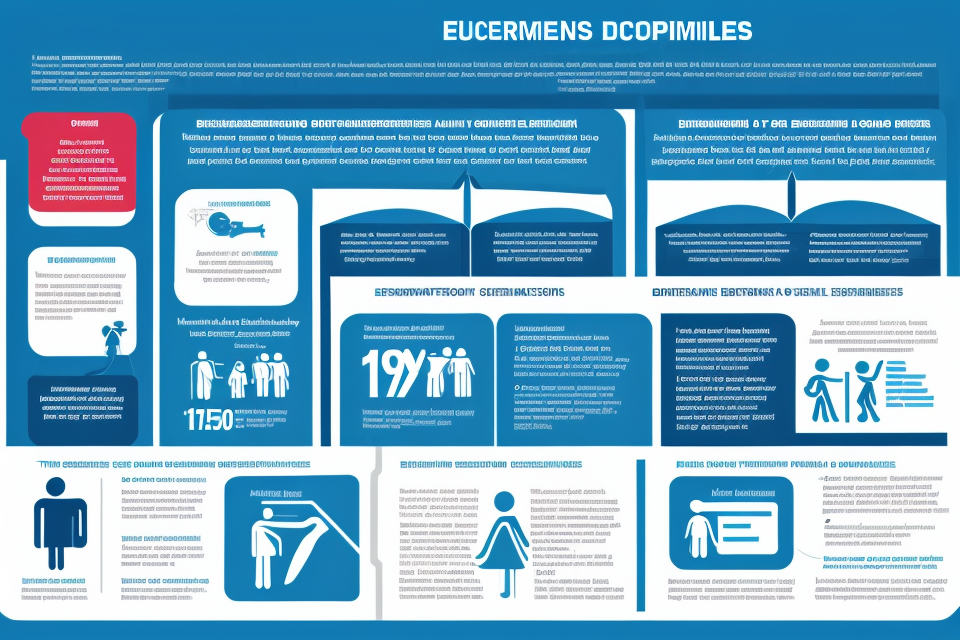
Regulations are the set of rules and guidelines that govern the behavior of individuals and organizations in society. These regulations are determined by various government departments, which are responsible for enforcing them. In this article, we will explore how regulations are determined and enforced in different government departments. We will examine the role of government departments in creating and implementing regulations, and how these regulations impact individuals and organizations. We will also look at the challenges and controversies surrounding regulations, and how they are subject to change over time. Join us as we delve into the world of regulations and discover how they shape our society.
Regulations are determined and enforced by different government departments through a combination of legislative and administrative processes. Legislative processes involve the creation and amendment of laws and regulations by the executive and legislative branches of government. Administrative processes involve the implementation and enforcement of these laws and regulations by government agencies and departments. Each department is responsible for enforcing the regulations within its jurisdiction, and may have its own specific procedures and protocols for doing so. For example, the Department of Transportation is responsible for regulating transportation-related activities, while the Environmental Protection Agency is responsible for regulating environmental protection.
Determining Regulations
Federal Regulations
The process of determining federal regulations is a complex and multi-step process that involves various branches of government.
Role of Congress:
Congress plays a significant role in the process of determining federal regulations. They have the authority to create laws, known as statutes, which can then be used to regulate various industries and activities. Congress can also give authority to federal agencies to create regulations through legislation.
Role of Federal Agencies:
Federal agencies are responsible for creating and enforcing regulations within their specific jurisdiction. These agencies are created by Congress to oversee specific industries or activities and have the authority to create regulations to ensure that these industries or activities are operating safely and effectively.
Overview of the Regulatory Process:
The regulatory process for federal regulations typically involves the following steps:
- Problem Identification: A federal agency identifies a problem or issue that needs to be addressed through regulation.
- Proposal: The agency creates a proposed regulation and publishes it in the Federal Register for public comment.
- Public Comment: Interested parties, including businesses, organizations, and individuals, can submit comments on the proposed regulation.
- Revision: The agency reviews the comments and makes any necessary revisions to the proposed regulation.
- Final Rule: The agency publishes the final regulation in the Federal Register and it becomes effective.
- Enforcement: The agency is responsible for enforcing the regulation and ensuring that businesses and individuals are complying with it.
It’s important to note that federal regulations can be amended or repealed by Congress through the legislative process. Additionally, federal agencies can also review and revise existing regulations to ensure they are still necessary and effective.
State and Local Regulations
State and local regulations are determined through a process that varies depending on the jurisdiction. In most states, the legislative branch is responsible for creating and enacting regulations, while local governments may have their own regulatory bodies or rely on state regulations.
The process of determining state and local regulations typically begins with the introduction of a bill by a state legislator or local government official. The bill is then reviewed by various committees and may undergo multiple revisions before being voted on by the full legislative body. If the bill is passed, it becomes law and is enforced by the relevant regulatory agency.
The role of state legislatures and local governments in the regulatory process is critical. They are responsible for ensuring that regulations are crafted in a way that balances the needs of businesses and individuals while also protecting public health and safety. In addition, they must consider the potential economic impact of regulations and ensure that they are not unduly burdensome.
The regulatory process for state and local regulations can be complex and time-consuming. It may involve multiple rounds of public comment and input from stakeholders, as well as environmental impact assessments and other studies. Once a regulation is finalized, it must be enforced by the relevant regulatory agency, which may impose penalties for noncompliance.
Overall, the process of determining and enforcing state and local regulations is a critical component of the regulatory system. It ensures that regulations are crafted in a way that balances the needs of businesses and individuals while also protecting public health and safety.
Administrative Regulations
Administrative regulations are a type of regulation that is established by federal agencies to implement and enforce laws passed by Congress. These regulations are designed to provide more detailed guidance on how to comply with the law and may cover a wide range of topics, including environmental protection, consumer safety, and financial regulation.
The process of determining administrative regulations typically begins with a notice of proposed rulemaking, which is published in the Federal Register. This notice provides a summary of the proposed regulation and invites public comment on the proposed rule. After the public comment period has closed, the agency will review the comments and make any necessary changes to the proposed regulation. The final regulation is then published in the Federal Register and becomes law.
Federal agencies play a key role in the process of determining administrative regulations. These agencies are responsible for developing and implementing regulations that fall within their jurisdiction, and they are required to follow a specific process when doing so. This process includes conducting a cost-benefit analysis, which evaluates the potential costs and benefits of the proposed regulation, and providing an opportunity for public comment.
The regulatory process for administrative regulations can be complex and time-consuming. It may involve multiple rounds of public comment and revision before a final regulation is adopted. However, it is an important tool for ensuring that federal agencies have the authority to enforce laws and protect the public interest.
Enforcing Regulations
Federal Enforcement
Enforcing federal regulations is a complex process that involves various federal agencies working together to ensure compliance with the law. The federal government has the authority to enforce regulations through a variety of means, including civil and criminal penalties, administrative actions, and even seizure of property.
One of the primary ways that federal regulations are enforced is through the use of civil penalties. Civil penalties are monetary fines that are imposed on individuals or businesses that violate federal regulations. These penalties are typically imposed by federal agencies such as the Environmental Protection Agency (EPA), the Food and Drug Administration (FDA), and the Securities and Exchange Commission (SEC).
In addition to civil penalties, federal agencies may also use administrative actions to enforce regulations. Administrative actions can include things like revoking a license, imposing fines, or even shutting down a business. For example, if a restaurant is found to be violating food safety regulations, the FDA may take administrative action against the restaurant by imposing fines or shutting it down until it comes into compliance with the law.
In some cases, federal agencies may also seek criminal penalties for individuals or businesses that violate federal regulations. Criminal penalties can include fines, imprisonment, or both. For example, if a company is found to have knowingly violated environmental regulations, the EPA may seek criminal penalties against the company and its executives.
Finally, federal agencies may also seize property as a means of enforcing federal regulations. This is typically done in cases where the property is being used to violate the law, such as in the case of illegal drugs or counterfeit goods.
Overall, the enforcement process for federal regulations is complex and involves a variety of different tools and techniques. Federal agencies work together to ensure compliance with the law and to hold individuals and businesses accountable for violations.
State and Local Enforcement
State and local governments play a crucial role in enforcing regulations within their jurisdictions. These regulations may include laws and rules related to environmental protection, public health, safety, and other areas that affect the well-being of the community.
Role of State and Local Law Enforcement Agencies
State and local law enforcement agencies are responsible for enforcing regulations within their jurisdictions. These agencies may include police departments, sheriff’s offices, and other law enforcement agencies that have the authority to enforce laws and regulations. They work closely with other government agencies, such as health and safety departments, to ensure that regulations are being followed.
Overview of the Enforcement Process for State and Local Regulations
The enforcement process for state and local regulations typically involves several steps. First, government agencies responsible for enforcing regulations will conduct inspections and investigations to ensure that businesses and individuals are complying with the regulations. If a violation is found, the agency will issue a citation or notice of violation to the offender.
The offender will then have an opportunity to respond to the citation or notice of violation, either by admitting the violation and paying a fine or by contesting the citation. If the offender contests the citation, a hearing will be held to determine whether a violation occurred and what penalties, if any, should be imposed.
In some cases, violations of state and local regulations may also be referred to the district attorney’s office for criminal prosecution. In these cases, the offender may face fines, imprisonment, or both, depending on the severity of the violation.
Overall, the enforcement of state and local regulations is critical to ensuring that businesses and individuals comply with laws and rules that protect the health, safety, and well-being of the community. By working together with government agencies and other stakeholders, state and local law enforcement agencies can help to ensure that regulations are enforced effectively and that the community remains safe and healthy.
Administrative Enforcement
Administrative enforcement refers to the process by which federal agencies enforce regulations within their respective jurisdictions. These agencies are responsible for ensuring that individuals and businesses comply with the regulations that they are responsible for enforcing. The following is a more detailed explanation of how administrative enforcement works.
- Role of Federal Agencies: Federal agencies are responsible for enforcing administrative regulations within their respective jurisdictions. For example, the Environmental Protection Agency (EPA) is responsible for enforcing environmental regulations, while the Securities and Exchange Commission (SEC) is responsible for enforcing securities regulations.
- Enforcement Process: The enforcement process for administrative regulations typically begins with an investigation. Federal agencies may conduct investigations to determine whether individuals or businesses are complying with the regulations that they are responsible for enforcing. If an investigation reveals that an individual or business has violated a regulation, the agency may take enforcement action.
- Enforcement Actions: Enforcement actions can take a variety of forms, depending on the severity of the violation. For example, the agency may issue a warning or a fine. In more serious cases, the agency may bring legal action against the individual or business.
- Appeals Process: Individuals and businesses that are subject to enforcement actions may have the right to appeal the decision. The appeals process varies depending on the agency and the specific regulation that was violated.
Overall, administrative enforcement is an important tool that federal agencies use to ensure that individuals and businesses comply with the regulations that they are responsible for enforcing. By conducting investigations and taking enforcement actions, these agencies help to ensure that regulations are followed, which can help to protect public health and safety, promote fair competition, and preserve natural resources.
FAQs
1. How are regulations determined in government departments?
Regulations are determined by government departments through a process of consultation and negotiation between various stakeholders, including government officials, industry experts, and members of the public. This process may involve the publication of proposed regulations in the form of a draft or white paper, followed by a period of public comment and feedback. Based on the feedback received, the government department will revise the regulations as necessary and issue a final version.
2. What factors are considered when determining regulations?
When determining regulations, government departments consider a range of factors, including the purpose and objectives of the regulations, the potential impact on businesses and individuals, the feasibility of implementation, and the cost-benefit analysis of the regulations. Additionally, departments may also consider international standards and best practices, as well as the recommendations of advisory committees and expert panels.
3. How are regulations enforced in government departments?
Regulations are enforced by government departments through a variety of means, including inspections, audits, and penalties for non-compliance. Enforcement actions may be taken by government officials, such as inspectors or regulatory officers, who have the authority to investigate potential violations and issue fines or other sanctions. In some cases, government departments may also work with other agencies or organizations to enforce regulations, such as law enforcement agencies or professional associations.
4. What happens if I violate a regulation?
If you violate a regulation, you may be subject to enforcement actions by government officials, such as fines or other penalties. The specific consequences of a violation will depend on the nature of the regulation and the severity of the violation. In some cases, violations may also result in legal action, such as a lawsuit or criminal charges. It is important to familiarize yourself with the regulations that apply to your business or industry and to ensure that you are in compliance with them.


